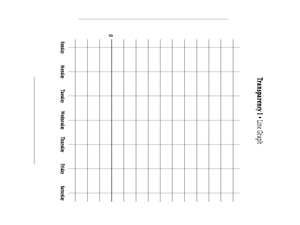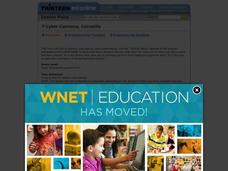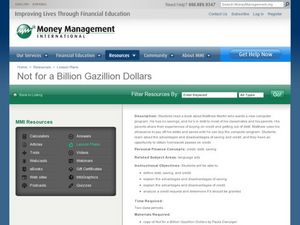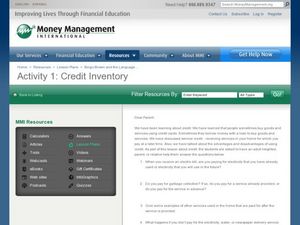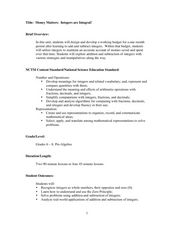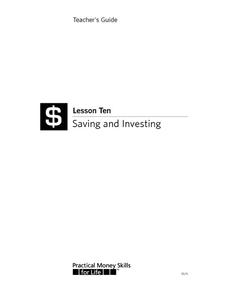Curated OER
Spending Plans
Students explore the concept of dividing their money into categories, namely "save," "spend," and "share." They engage in activities that help them explain that money is limited in quantity and must be divided for different purposes.
Curated OER
The Business of Interest
Young scholars learn about finance and money management and use math to solve problems, communicate, and explore real life situations as they deal with banks. In this financial management lesson, students apply their math skills to real...
Curated OER
Thinking About Money
Students evaluate various approaches to spending money.In this spending money literacy lesson plan, students broaden their financial goals by reading "Alexander Who Used to Be Rich Last Sunday" and "A Chair for My Mother."Students use a...
Curated OER
Spend, Save, Invest or Donate (9-12)
Students explore the concept of personal finance. In this philanthropy instructional activity, students examine decisions they make about money as they discover the definitions of philanthropy, resources, scarcity, choice, benefits,...
Curated OER
Saving and Investing
Fifth graders participate in activities to promote understanding of investing and saving. In this saving and investing lesson plan, 5th graders design a portfolio, play a card game and write a skit about the importance of investing.
Curated OER
Less Than Zero
Students keep track of money. In this money management lesson plan, students read Less Than Zero by Stuart J. Murphy and manipulate a number line to keep track of spending and borrowing in the story.
Curated OER
Cyber Currency, Currently
Students explore the value of currency and how to save and earn interest. In a key lesson, kids even get to purchase items in their classroom's general store. It's a fun way to learn the importance of being financially literate!
College Board
2003 AP® Macroeconomics Free-Response Questions Form B
Learners consider production possibilities using an authentic test question from College Board. Other questions include practicing supply and demand curves and examining the effects of inflation, employment, and other variables on a...
Radford University
Beach House
What's the best way to make a beach house affordable? Given constraints on the number of rooms and the cost of flooring, learners design dream beach houses. They draw floor plans and calculate the areas using different units.
Council for Economic Education
Timing Is Everything
Learners discuss the incentives and opportunity costs of spending vs. saving. They follow an interactive website which shows them the how much money they could end up with by saving instead of spending.
Curated OER
Anthony's Allowance
In this problem solving worksheet, students read one problem about a boy who saves a specified amount of money each day. Students identify the pattern and answer the questions.
Curated OER
Is the Price Right?
In this money management, students study inflation. Students complete the given table filling in the 15 spaces for the prices of items for three different given years.
Curated OER
The Hundred Penny Box
Students analyze the advantages of regular saving and how savings grow with compounding. After reading the story "The Hundred Penny Box", students define the terms "interest," "interest rate," and "compounding." Through several...
Curated OER
Not for a Billion Gazillion Dollars
Students discover what debt, saving, and credit are. In this personal finance lesson, the teacher reads Not for a Billion Gazillion Dollars, and the students discuss what the main character does in the book in relation to debt,...
Curated OER
The Berenstain Bears' Mad, Mad, Mad Toy Craze
Learners explore personal finances. In this money management lesson, students read The Berenstain Bears' Mad, Mad, Mad Toy Craze. Learners examine the spending habits of Brother Bear and Sister Bear. Students analyze opportunity costs as...
Curated OER
The Leaves in October
Young scholars determine whether or not to save or spend and defend a decision. In this personal finance lesson, students identify opportunity cost of various spending and saving decisions. Young scholars read a story where two...
Curated OER
Credit Inventory
In this money management activity, students read a paragraph regarding credit and then respond to 6 short answer questions regarding credit.
Curated OER
Creating a Savings Chart
Student create a savings chart given a set allowance per week. They explain how people in the local community make choices about using goods, services, and productive resources, and how they compare costs and benefits in economic...
Curated OER
Introduction to the National Debt
Students relate the national debt to the economy. In this algebra lesson, students discuss what the national debt is, create a national budget based on priority and what the government should spend money on. They analyze their findings...
Curated OER
Green Stuff: Designing an Earth-Friendly Room
In this activity students explore earth-friendly materials that can be used in home environments. They learn about the relationship between the environment and design, and use a variety of problem-solving strategies. They work in...
Curated OER
Money Management Part III: Savings Accounts and Cash vs. Credit
Help your class understand the importance of saving and managing their money. Here is part three to a unit on credit, cash, and savings. Learners discuss savings accounts and the idea that a budget plan can help them avoid costly credit...
National Security Agency
Money Maters: Integers are Integral!
A thoroughly-written lesson plan and a plethora of worksheets about integers comprise this resource. Neophyte number crunchers learn to recognize integers, add and subtract them, and apply the concepts to the designing of a personal...
Visa
Saving and Investing
Impress upon your young adults the importance of saving and investing, and give them a foundational vocabulary from which they can continue to build their financial literacy. This lesson plan covers short- and long-term budget goals,...
DiscoverE
Textbook Support Challenge
Textbooks are heavier than a sheet of paper, so how can paper hold up a textbook? Young engineers create a structure out of paper that can support a textbook. To add another wrinkle, they must stay within budget and time constraints.







